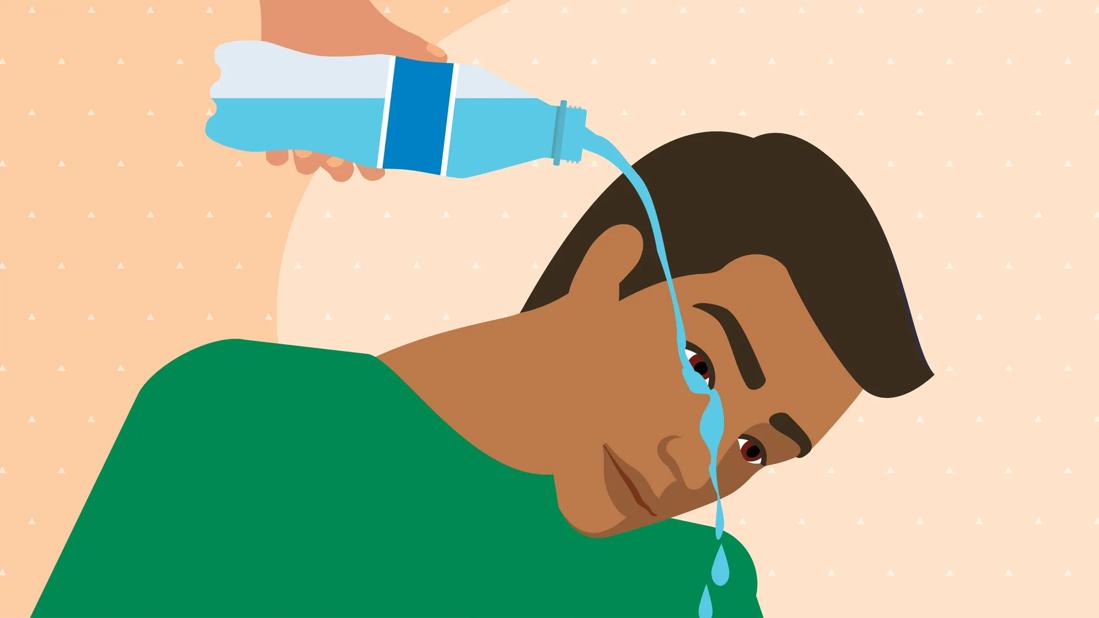Act quickly by locating the object, gently removing the debris and flushing your eye

Image content: This image is available to view online.
View image online (https://assets.clevelandclinic.org/transform/66acbe3d-c178-4ec5-8db5-7ad0f43adabf/pouring-water-washing-eye-1138211678)
Person pouring bottled water over eye to flush it out
Few things are more irritating or panic-inducing than getting something stuck in your eye. Your instincts might make you want to immediately rub your eyes, but don’t do that! Swiping at your eyes can cause more damage and lead to possible infection.
Advertisement
Cleveland Clinic is a non-profit academic medical center. Advertising on our site helps support our mission. We do not endorse non-Cleveland Clinic products or services. Policy
Instead, optometrist Robert Engel, OD, suggests this step-by-step process for safely removing foreign objects from your eyes.
Your eyes are generally good at flushing stuff out on their own with tears and eyelashes. But sometimes, your eyes might need a little extra help if they’re dealing with dirt, sand, pollen and other small debris.
If you suspect something is in your eye, here’s what to do.
Wash your hands with soap and water before touching your eyes. The last thing you want to do is introduce more debris or germs that can cause an eye infection.
If you have a chemical or liquid in your eye, move to step four. Otherwise, stand in front of a mirror. Using your clean index finger, gently pull your lower eyelid down or your upper eyelid up and away from your eye. Look up, down and side to side. See if you can spot any solid foreign objects.
If the object is on the white part of your eye or on your lower eyelid, you can gently remove it by touching it with a clean cotton swab, tissue or your well-washed finger. If you have difficulty removing it, it helps to gently move it toward the corner of your eye.
Don’t attempt to remove it if the object is on the colored part of your eye. “Trying to poke it out could cause trauma,” warns Dr. Engel. Instead, move to the next step.
Advertisement
Any chemical or foreign liquid should be flushed out of your eye immediately.
“Basic soaps and household detergents usually only cause mild symptoms and can be treated with a simple rinse with eye wash, saline or water for several minutes,” advises Dr. Engel.
“However, hydrogen peroxide, drain-clog liquids, solid and liquid fertilizers, and concentrated acids can cause serious eye injury.”
If you’ve been splashed by one of these chemicals, you should flush your eyes immediately as follows:
“The goal is to get a gentle stream of water or solution running over your eyes to flush out whatever got in,” says Dr. Engel. “It’s normal to have some discomfort and some blur after flushing. However, if the eyes are still in extreme pain, are light sensitive or look unusually white (indicating loss of tissue), seek care as soon as possible.”
If you get something in your eye:
If you get metal or chemicals in your eyes, or if you’re unable to remove small debris, make an appointment with a healthcare provider. You should also see your eye doctor if your eyes are:
“We’ve got special tools and tricks to take things out,” says Dr. Engel. “If you can remove something safely without causing more harm, that’s good. But if you have any concerns or you’re unsure what to do, come see us.”
Advertisement
Advertisement

Sign up for our Health Essentials emails for expert guidance on nutrition, fitness, sleep, skin care and more.
Learn more about our editorial process.
Advertisement
The benefits of these drugs typically outweigh potential risks — but talking about your eye health and GLP-1s with your provider is advised
Once your baby’s eyes are exposed to more light, they may start to deepen in hue or change color altogether, usually between 3 and 9 months
Many factors, like eyelid irritation, cosmetic lash procedures and underlying health conditions, can affect your eyelashes
A diet built around fruits, vegetables and healthy fats is a clear 20/20 benefit for your vision
It takes millions of moving parts within the eye to make the power of vision possible
Cosmetic procedures such as iris implants and corneal tattooing bring a risk of vision loss
If your eyes suddenly take on a different color, it could be a sign of a medical concern
This glaucoma drug can also thicken lashes, just note side effects
Prioritize your health by managing stress, strengthening your social connections and getting quality sleep
Bolsters, blankets, pillows and blocks can offer extra support, stability and comfort
Allergies, postnasal drip, asthma or reflux could be to blame for a cough that won’t quit